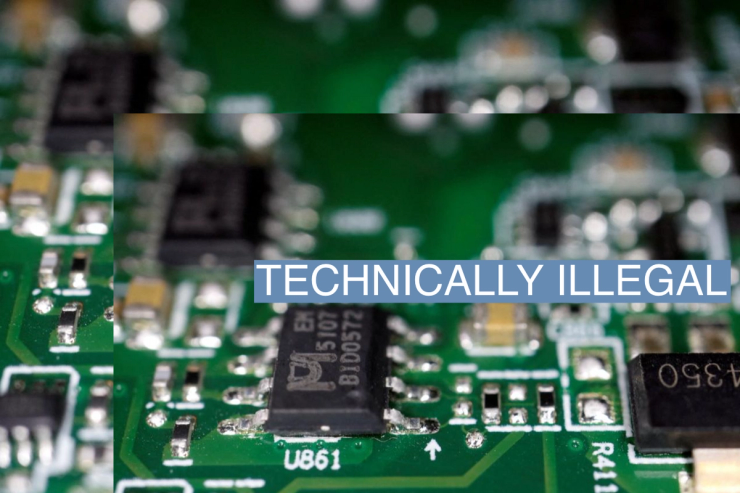The Scoop
Western governments are on a mission to tighten sanctions aimed at cutting off Russia’s access to computer chips used in weapons production — a task that’s proven devilishly difficult since the Kremlin’s invasion of Ukraine.
Along with their counterparts from the European Union and U.K., senior U.S. Treasury Department officials recently embarked on a world tour during which they met with political and industry leaders in Kazakhstan, Kyrgyzstan, Switzerland, Austria, Italy, and Germany. At the meetings, an American official involved in the effort told Semafor, they presented a list of nine specific high-tech items that the U.S. has banned from sale to Moscow, and urged governments and businesses to take their own more aggressive steps to help shut down shipments.
The document, which was shared with Semafor, also outlines six sanctions evasion schemes Washington believes the Kremlin is using to acquire semiconductors and other electronics central to Russia’s production of the guidance systems for its missiles, drones, tanks, and other military hardware.
Most of this technology is dual use, meaning it could also be used in making regular consumer products like cell phones, radios, printers and washing machines. In some cases, Russia appears to be buying these sorts of goods, then stripping them for their high tech parts.
During their stops in Europe, Treasury officials met with business executives to make sure they understood how their tech could be exported into Russia after being sold to a buyer in another country — a problem known as transhipment.
The document presses countries to make sure their government regulators and private companies “take all necessary steps to ensure any financial transactions involving the following goods are not benefiting Russia or Russia-linked firms.”
Washington’s strategy has involved a mix of cajoling and threats that if countries or businesses don’t cooperate, they could face punishments of their own. In a statement from April, the Treasury Department said it was “outlining the clear business decision at hand: remain connected to the global economy or provide material support to Russia’s war and be denied access to the world’s most important markets.”
In this article:
Jay’s view
After Vladimir Putin’s invasion of Ukraine, the U.S. and Europe imposed stiff sanctions on Russia aimed at blocking Moscow’s ability to obtain technology, like semiconductors, needed for missiles and drones. But, as this recent diplomatic push highlights, that effort hasn’t been totally successful.
Trade data compiled by Russia watchers show that Moscow drastically altered its procurement channels over the past year for items like chips, away from the West and towards Asia, former Soviet states, and the Middle East.
China, a close Moscow ally, has been a particularly huge supplier. But Russia has also been able to acquire U.S. and European electronics through cutout companies and sanctions-evaders in the United Arab Emirates, Turkey, Estonia, Kazakhstan, and Kyrgyzstan, according to U.S. and European officials.
Trade data shows that Russia actually grew its total imports of semiconductors to $2.5 billion in 2022 from $1.8 billion the year before, according to a January report by the Free Russia Foundation. The value of Chinese chip exports to Russia jumped to over $500 million last year from $200 million in 2021. And Russia’s electronics imports from Turkey, Kazakhstan, Kyrgyzstan, and Estonia – mainly transshipments of Western goods – also grew.
The pace of these imports has slowed as the U.S. and Europe have stepped up their sanctions enforcement. But military analysts say Russia still appears to be producing missiles and drones with the required electronics for their guidance systems.
John Hardie of Washington’s Foundation for Defense of Democracies think tank has tracked the downing of Russian Kh-101 cruise missiles in Ukraine and says the serial numbers on the projectiles indicate they’ve been produced in recent months, and at a relatively steady rate. He said this pace, at least one cruise missile every three days, is likely higher than before the Ukraine war.
“They’re chock full of Western microelectronics. So, Russia has to continue trying to get hold of this stuff,” Hardie said. “I think, so far, it’s been fairly successful.”
Know More
The Treasury’s proscribed list includes four types of integrated circuits, or microchips; machines for the “reception, conversion and transmission of or regeneration of voice, images or other data”; radar equipment; and capacitors to store electrical charges. The Treasury stressed to leaders in Kazakhstan that Russia was seeking to use its territory to acquire “specific semiconductors and other electronic integrated circuits to power its missiles and drones,” according to a readout the Treasury Department released after a visit to the country.
The Treasury list also presses suspect countries to closely look for “red flags” that identify Kremlin schemes to evade Western sanctions. These include falsifying contracts and bills of lading to hide Russian end-users, atypical payment systems, and the use of bulk cash in purchases.
“Russia has sought to use cut-outs, facilitate opaque payments, and exploit third countries — especially those with high levels of integration with its own economy— to circumvent sanctions and export controls,” the Treasury officials told leaders in Almaty and Bishkek.
Room for Disagreement
One could argue that the U.S. and Europe have been surprisingly successful at rallying countries to their cause considering many are deeply integrated into the Russian economy.
Kazakhstan, for instance, shares an oil pipeline with the Kremlin that ships both Kazakh and Russian oil to the West. Kyrgyzstan’s companies and banks are totally enmeshed with Russia’s, and Kyrgyz workers remit billions of dollars from their neighbor every year.
While U.S. and European officials remain worried about these former Soviet states, there are signs their pressure is having an impact. Kazakhstan ramped up oil exports that bypassed Russia during the first quarter of 2023. And a leading Kazakh bank, apparently spooked by the Treasury officials’ recent visit, announced it was restricting its dealings with Russian and Belarusian nationals.
The Kyrgyz government, meanwhile, met with State Department officials last month and announced steps aimed at reorienting the country away from its dependence on Russia. This includes helping Kyrgyz banks open more corresponding accounts with American financial institutions and to promote more U.S. direct investments in the country – which used to host an American military base.
Notable
- In December, Reuters released an investigation into how Russia’s supply chain continued to procure U.S.-made electronics for the Kremlin’s weapons programs.
- China’s ambassador to France caused an uproar last month by suggesting the former Soviet states aren’t sovereign countries.


